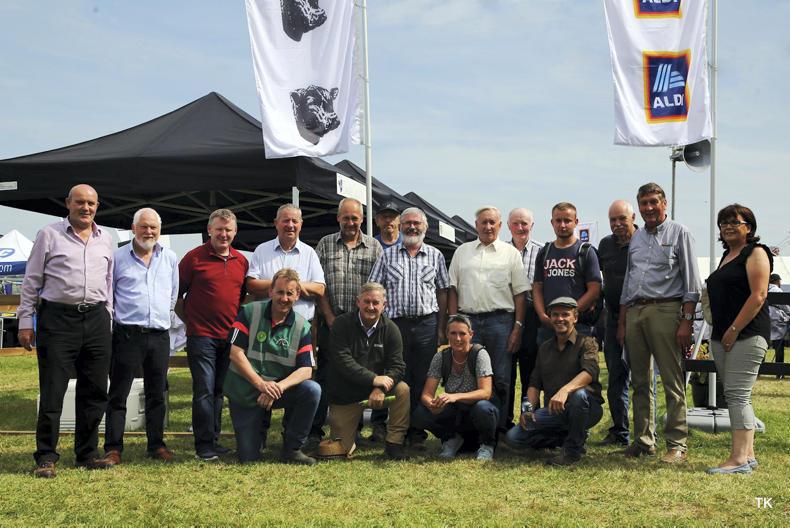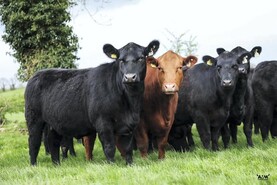New markets and building alliances are something that we always strive for in the agricultural industry in Ireland, especially at a time when there is so much uncertainty as to what the future holds with current markets.
Last August, the Irish Angus Cattle Society welcomed 45 Angus breeders from the Federal Association of German Angus Holders (BDAH), a German Angus breed society, to Iverk Show in Piltown, Co Kilkenny, for the Aldi Irish Angus all-Ireland bull calf championships.
The trip originally stemmed from contacts that Irish Angus members made on the 2018 European Angus forum trip to Estonia. Since that forum, there was regular contact and plans were put in place for the German breeders to visit the Iverk Show.
The Germans were very pleased with the quality of Angus animals that were displayed on the day and the show in general, with many stating that they thought it was one of the finest shows that they had ever seen.
BDAH president Richard Brineette commented on the female show class in Iverk: “The prizewinners impressed us; the cows had large frames, long metacarpus, correct foundations, a lot of meat and most cows have weight near to a tonne. Perhaps in those cases a little too big for German standards.”
Following the show, a number of the German breeders made enquiries about buying some of the animals present and a number of deals were struck with the breeders of the animals that suited what they required in Germany.
After the show, arrangements were made for the German breeders to visit a few Irish Angus farms around the country; they then went on to make further purchases on these farms.
The Irish Angus herds that sold cattle to Germany were Ben and Elaine Ryall of Fellfort Angus Watergrasshill, Co Cork; Donagh Mc Carty of Lemonfield Angus, Crecora, Co Limerick; Patrick O’Donnell, Lyreen Angus, Mitchelstown, Co Cork; Michael Cronin, Carker Angus, Scartaglen, Co Kerry; Shane McKiernan, Drumcarbin Angus, Ballinagh, Co Cavan; Michael Horan, Coolcran Angus, Ballina, Co Mayo; Donal Spring and Geraldine Shanley of Aughnamona Angus, Bornacoola, Co Leitrim; and Irish Aberdeen Angus breeder John McEnroe, Liss Angus, Oldcastle, Co Meath. Leo Mc Enroe, Lisduff, Co Cavan, facilitated the export and the cattle were transported with Moffett Livestock.
Impressed
From speaking to some of the buyers, they were very impressed with the type of Angus animals in Ireland. A lot of the reasons that most of them did not come to purchase stock in Ireland before was because they had a misconception that we didn’t breed the type of cattle here that suited their requirements.
They look for cow types that are not overly big, with good feminine characteristics that are easy fleshing and light on the bone.
Similarly, for the bulls, they had to be moderate in size, with light bone, requiring a good head, good topline and most importantly easy calving.
They didn’t appear to be looking for show-type characteristics; it was really good production cattle they wanted. A lot of the buyers requested to see the dam before they made a decision on buying their heifer and they knew exactly what they were looking for in a bull.
Export procedure
To export cattle to Germany, there is a complex quarantine procedure that breeders must adhere to for their animals to be passed fit for export.
Firstly, the animals have to be quarantined for 30 days on a Department-approved site. This can be on farm where the animal(s) are separated away from any other cattle on the farm and do not come into contact with any other animals on the farm over the 30-day quarantine period.
Due to the strict IBR restrictions in Germany, the animals have to be tested free of IBR and TB before leaving the quarantine.
At the time of arrival to the Department inspection centre, the animal is then inspected by a Department vet prior to boarding the lorry for shipping.
When the animals arrive in Germany, they are quarantined for another 30 days and have to be tested for TB and IBR for a second time before they can be released to the breeder.
If one of the animals that was imported showed positive for IBR, the whole group of imported animals would not pass fit for export and, in this circumstance, would have to be slaughtered.
Thankfully, all the animals passed their quarantine and tested negative for IBR and TB and were safely exported to Germany and have since settled in well on farms.
This really says a lot for Ireland’s IBR status, as animals were purchased and quarantined in many different locations around the country.
Richard Brineette, also a purchaser of some of the exported animals, gave an outline of the German herds that have purchased animals.
“The breeding bulls are joining suckler herds from sizes of 25 cows right up to 800 cows and farm sizes varying from 25ha up to 1,100ha.
“Most of the bulls have been let out with cattle, with some of the younger bulls being held off until May or June, when they are a bit stronger. The first of the calves are due to be born in September of this year.”
Richard added: “I would like to thank the Irish Angus Cattle Society for the very warm welcome, the hospitality, the good Irish whiskey and the friendly conversations and kind gifts. We were thrilled with the green island and the development of Angus breeding in Ireland.”
This year above all others is a fantastic time for Ireland to be exporting Angus cattle to Germany, as the country will be hosting the 2020 European Angus forum in July.
This event will attract breeders from all over Europe and the rest of the world. Some of the animals exported were purchased by host farms that will be visited on the forum tour.
Germany may not turn out to be a huge market for Irish Angus cattle in years to come. Nevertheless, if these animals breed successfully in Germany, they are sure to be back again in the future and any new market will be a welcome boost for pedigree Angus breeders in Ireland.






 This is a subscriber-only article
This is a subscriber-only article









SHARING OPTIONS: